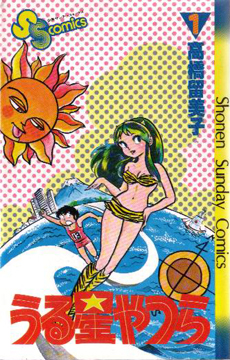Urusei Yatsura
| Urusei Yatsura | |

Cover art of the 1980 first tankōbon volume featuring lead characters Ataru Moroboshi and Lum Invader
|
|
| うる星やつら | |
|---|---|
| Genre | Teen comedy, Romance, Science fiction |
| Manga | |
| Written by | Rumiko Takahashi |
| Published by | Shogakukan |
| English publisher | Viz Media |
| Demographic | Shōnen |
| Magazine | Weekly Shōnen Sunday |
| Original run | 1978 – 1987 |
| Volumes | 34 |
| Anime television series | |
| Directed by |
Mamoru Oshii (1-106) Kazuo Yamazaki (107-195) |
| Written by |
Takao Koyama (1-54) Kazunori Ito (55-106) Michiru Shimada (107-195) |
| Music by | Fumitaka Anzai Katsu Hoshi Shinsuke Kazato |
| Studio |
Studio Pierrot (1-106) Studio Deen (107-195) |
| Licensed by | |
| Original network | FNS (Fuji TV) |
| English network | |
| Original run | October 14, 1981 – March 19, 1986 |
| Episodes | 195 |
| See also | |
Urusei Yatsura (うる星やつら?) is a comedic manga series written and illustrated by Rumiko Takahashi and serialized in Weekly Shōnen Sunday from 1978 to 1987. Its 374 individual chapters were published in 34 tankōbon volumes. It is the story of Ataru Moroboshi, and the alien Lum, who believes she is Ataru's wife after he accidentally proposes to her. The series makes heavy use of Japanese mythology, culture and puns. The series was adapted into an anime TV series produced by Kitty Films and broadcast on Fuji Television affiliates from 1981 to 1986 with 195 episodes. Eleven OVAs and six theatrical movies followed, and the series was released on VHS, Laserdisc, DVD, and Blu-ray Disc in Japan.
The manga series was republished in different formats in Japan. Viz Media licensed the series for English publication in North America under the names Lum and The Return of Lum, but dropped the series after nine volumes were released. The television series, OVAs, and five of the films were released in North America with English subtitles, as well as a dub for the films by AnimEigo. They provided extensive notes on the series to allow people to understand the many cultural references and jokes in the series that would not normally be understood by non-Japanese. The remaining film, Beautiful Dreamer, was released bilingually by Central Park Media. Five of the movies, as well as the OVA's, are available from MVM Films in the United Kingdom. The series was released on television in Southeast Asia as Lamu the Invader Girl.
...
Wikipedia
